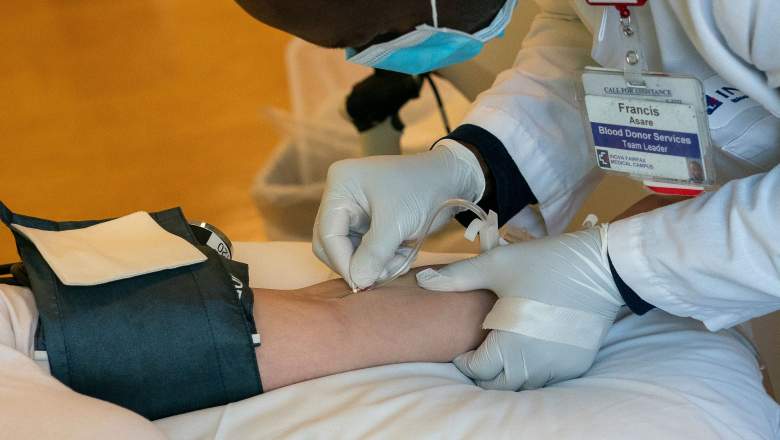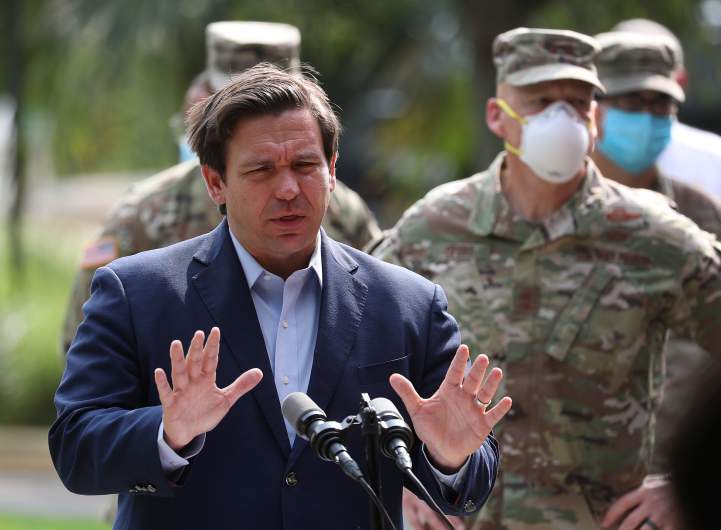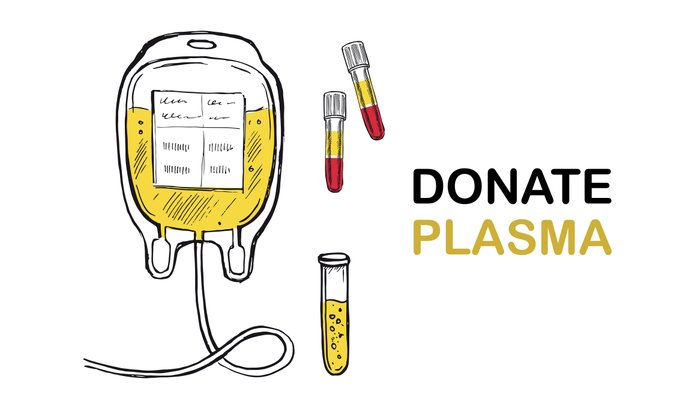
Getty A phlebotomist inserts an IV line as Mckinley Edelman, 26, a recovered COVID-19 patient, donates plasma to MedStar Georgetown University Hospital at Inova Blood Services on April 22, 2020 in Dulles, Virginia.
With no end to the spread of coronavirus in sight in Florida, and limited options to mitigate the damage the virus can cause to those severely affected, the Department of Health issued a plea for plasma from recovered patients Friday to help new cases, even as they’re not fully sure if it works to help treat the disease.
According to The Food and Drug Administration, “If you have fully recovered from COVID-19, you may be able to help patients currently fighting the infection by donating your plasma. Because you fought the infection, your plasma now contains COVID-19 antibodies. These antibodies provided one way for your immune system to fight the virus when you were sick, so your plasma may be able to be used to help others fight off the disease.”
Yet the FDA says they aren’t even sure if it will help, writing, “Further investigation is still necessary to determine if convalescent plasma is safe and effective as a treatment for COVID-19, and whether it might shorten the duration of illness, reduce morbidity, or prevent death associated with COVID-19.”
But it’s something.
As cases in the state continue to soar, with 11,345 new cases reported Friday and 156 new deaths, Florida’s Governor DeSantis remains steadfast in his promise to keep most businesses open, calling on the state’s residents to follow the CDC guidelines of avoiding crowded places, closed-in spaces, and close-contact settings.
There is no mask mandate in the state as a whole, but several municipalities have mask-wearing ordinances in place. The state entered its second phase of reopening on June 5 and has stayed there as the number of cases and deaths continues to break records in the state.
One thing that did rollback after the second phase of reopening was the closures of bars. On June 26 after cases began to climb, the Secretary of Department of Business & Professional Regulation, Halsey Beshears, made that call — not the governor. But it only applies to bars that don’t serve food, not to restaurants that sell alcohol or have bars in them.
Hospitals Are Feeling the Strain of an Influx of COVID-19 Patients
Miami Mayor Carlos A. Gimenez said Friday that his normal hospital ICU beds were over capacity, but they haven’t yet reached “absolute capacity” according to CNN’s Ana Cabrera.
“The mayor said that hospitals have the ability to add hundreds of ICU beds by not having elective surgeries, which allows for the hospitals to convert the recovery rooms into ICU rooms. He also said that the number of beds available is a rolling number,” Cabrera reported.
In the Tampa Bay area hospitals are working to care for the influx of patients they’re seeing who are sick with COVID-19 — but it’s a struggle.
Dr. Jason Wilson, an emergency room physician at Tampa General Hospital, told The Tampa Bay Times, “I don’t know how long we can sustain these high numbers.”
The paper reported, “In March, April and May, the hospital saw about 15 patients infected with the virus each day. Now, there are often 70 or more, and about 40 percent end up in the intensive care unit, Wilson said. About half are placed on a ventilator.”
Another issue is that medical workers are tired. Dr. Angus Jameson, medical director of Pinellas emergency services and an emergency department doctor at Tampa General, told county commissioners that “nurses and doctors are tired after months of working through the pandemic,” according to the Tampa Bay Times.
“You should know that your hospitals are stressed and strained, and so are your health care workers,” Jameson said. “Whatever you think about the various testing numbers, I want to be sure that people understand that the hospitals are seeing the real impact of this.”
The Agency for Health Care Administration reported hospital bed availability is at 21.85% statewide on Friday.
Florida Democratic Leaders Are Calling on Gov. DeSantis to ‘Finally Take Action’ to Slow the Spread of COVID-19

GettyFlorida Gov. Ron DeSantis gives updates about the state’s response to the coronavirus pandemic during a press conference on April 17, 2020 in Fort Lauderdale, Florida.
Twelve of 13 Florida’s Democratic Delegation signed a letter to the Florida Governor “to finally take strong action to slow the spread of the novel coronavirus in Florida,” according to the Miami Herald. They are asking for a mask mandate and stay-at-home orders where cases of the virus are “raging.”
The letter said in part:
We ask that you immediately impose a statewide mask order and stay-at-home orders recommended by public health officials in parts of the state where the outbreak is raging. By failing to reopen our state in the safe, smart, and step-by-step manner that you promised, and by ignoring [U.S. Centers for Disease Control and Prevention] gating criteria, our state may be forced into a statewide economic shutdown, either by your order or simply because Floridians and visitors do not feel safe.
According to The Guardian, “If Florida were a country, it would be one of the world’s biggest hotspots.”
In the last week, the state has seen three of the highest number of new cases it’s had since March, with 15,259 cases reported on Sunday, 12,294 new cases reported on Tuesday, and 13,859 cases reported on Thursday, according to the Florida Department of Health.
DeSantis continues to say that a one-size-fits-all approach isn’t right for the state, since different counties have varying levels of infection, with some counties’ cases remaining relatively low in Florida’s panhandle.
READ NEXT: Masks Kept 139 Clients of COVID-19 Infected Hair Stylists From Getting Sick: CDC
